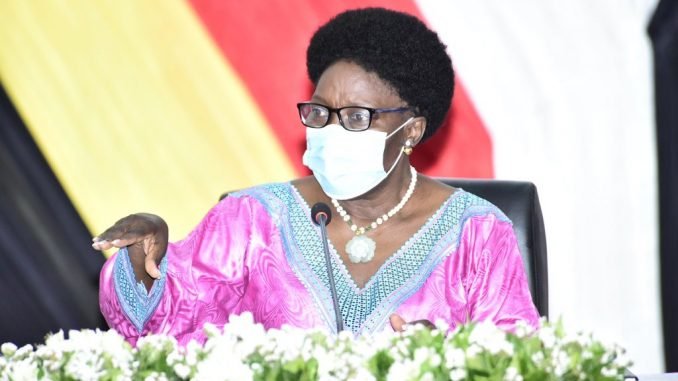
Kampala, Uganda |By Parliament of Uganda | As the country gears up for the 2021 general elections, the Speaker of Parliament, Rebecca Kadaga has reminded journalists of their role in sensitizing and mobilizing voters to shape the electoral process positively.
“The media can promote free and fair elections through civic awareness, publicizing electoral laws, exposing electoral malpractices, fact checking political statements and giving analysis to enable voters make informed decisions,” she said.
This was contained in a speech delivered on her behalf by Parliamentary Commissioner, Safia Nalule during the swearing in of the new executive of the Uganda Parliamentary Press Association (UPPA). The event also had a debate on the theme, ‘Role of the media in promoting free and fair elections’.
Kadaga said that Ugandans expect fairness, accuracy and impartiality from the media when reporting on campaigns, hosting guests or analyzing politics.
“I appeal to journalists and all media stakeholders to uphold professional ethics during the election period and at all times,” Kadaga said adding,“I also remind the media to be balanced and gender sensitive while interviewing and profiling female candidates because this area is still wanting”.
In response to a request by the journalists for the expeditious establishment and operationalisation of the Communications tribunal under the Uganda Communications Act, Kadaga pledged to engage President Museveni.
The UPPA president, Moses Mulondo reaffirmed the commitment of media practitioners in promoting free and fair elections, but was quick to add that their rights have often been violated while on duty.
“Uganda Communications Commission (UCC) and the police force have been implicated several times in violating press freedom. We declare our unwavering commitment to press freedom and will not hesitate to protest acts that violate press freedom,” he said.
Peter Mwesige, the Executive Director of African Centre for Media Excellence (ACME) challenged the media to pay attention to the quality of the information they churn out to the public.
He called for coverage and debates that are accurate, relevant and provide context.
“What kind of debate is the media facilitating? Is it meaningful dialogue that generates useful information or superficial exchanges for shouting matches that excite rather than inform,” he said.
The United Nations High Commission on Human Rights Representative in Uganda, Robert Ayeda Kotchani expressed concern over the continued arrest and attacks on journalists, where perpetrators of such human rights violations are not brought to face justice.
“Providing accurate and reliable information to the public is not a crime but rather a noble endeavour. Many of you work under principles of professionalism, he said.
He also pledged to join and avail efforts for the establishment and operationalisation of the communications tribunal.
The European Union Head of Delegation to Uganda, HE Attilio Pacifici reaffirmed the EU’s efforts in ensuring a professional, vibrant and safe media space before, during and after the elections.
“Unfortunately, professional Ugandan journalists have often been subjected to harassment, intimidation and physical attacks as a result of doing their job. We renew our call to all relevant authorities to ensure journalists and media workers are protected and allowed to carry out their functions,” he said.
Pacifici also underlined the role of the EU in the electoral process, saying that their participation is nonpartisan and is based on the invitation from the government.
Read Also: Journalism losing its clout to activism – Media Experts
“We have not been invited to monitor or observe this election but we commit to support the local observers whenever called upon,” he said.
The Spokesperson of the Electoral Commission (EC), Paul Bukenya called on the media to work with the electoral body to demystify the notion that scientific elections are intended to disenfranchise voters.
“It has confused people and as a result, voter education has become difficult. The media needs to make the public appreciate the environment in which the elections will take place, including limiting gatherings to avoid the spread of Covid-19” he said.



